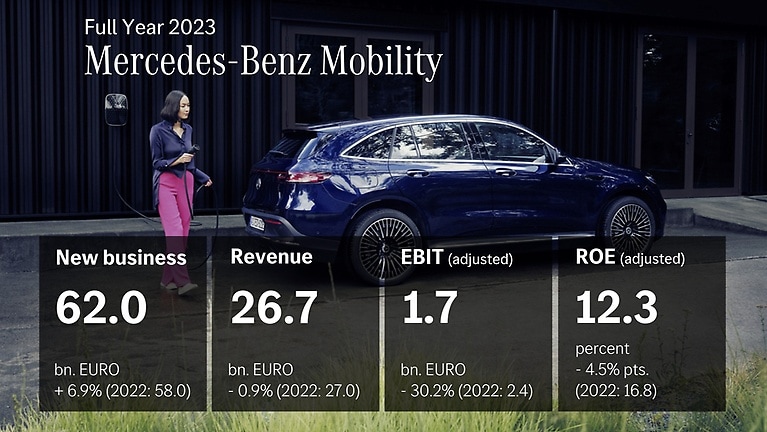
Mercedes-Benz Mobility AG
Siemensstr. 7
70469 Stuttgart
Deutschland
Tel.: +49 711 17 0
E-Mail: mobility@mercedes-benz.com
Please send queries about content on this website to any contact. You can address your concerns to us in English and your respective national language.
Represented by the Board of Management: Franz Reiner (Chairman), Jörg Lamparter, Susann Mayhead, Christina Schenck, Peter Zieringer
Chairman of the Supervisory Board: Harald Wilhelm
Commercial Register Stuttgart, No. HRB 737788
VAT registration number: DE 81 11 20 930

Mercedes-Benz Group AG (ticker symbol: MBG) achieved solid 2023 financial results. A sharpened focus on desirable cars and vans combined with ongoing cost discipline resulted in Group Earnings Before Interest and Taxes (EBIT) of €19.7 billion (2022: €20.5 billion), and revenues of €153.2 billion (2022: €150.0 billion). For 2023, Mercedes-Benz Cars delivered an adjusted Return on Sales (RoS) of 12.6%, Mercedes-Benz Vans an adjusted RoS of 15.1%, and Mercedes-Benz Mobility an adjusted Return on Equity (RoE) of 12.3%, in a challenging environment marked by supply-chain constraints as well as geopolitical and macroeconomic volatility.


"Mercedes-Benz continued its transformation in 2023, developing new cutting-edge electric and digital innovations, while scaling electric vehicles and delivering solid financial results. In other words, the team once again came through to execute our strategy in challenging times, delivering the eSprinter and the new E-Class. At the same time, we prepared the ground for next-generation products and platforms like VAN.EA and MB.OS. to keep Mercedes-Benz at the forefront of the industry."
Ola Källenius
Chief Executive Officer of Mercedes-Benz Group AG
The Free Cash Flow of the Industrial Business reached €11.3 billion (2022: €8.1 billion) mainly due to high profitability, a high cash conversion rate and lower working capital. The Net Liquidity of the Industrial Business rose to €31.7 billion (end of 2022: €26.6 billion). Group investments in property, plant and equipment in the full year totaled €3.7 billion (2022: €3.5 billion). Research & Development expenditure amounted to €10.0 billion (2022: €8.5 billion).
Mercedes-Benz gained certification for its SAE Level 3 conditionally automated driving system for use on freeways in Nevada and California and received permission to test its L3 systems on highways in Beijing. These innovations come ahead of the introduction of its operating system MB.OS which will be launched with the new Mercedes-Benz Modular Architecture (MMA) which sets new efficiency benchmarks. Mercedes-Benz started its rollout of a dedicated high-power charging network, with sites opening in China, the U.S. and Germany. The company also continued expanding its direct sales model including most recently in Thailand. Direct sales is now live in 11 markets and covers more than 50% of sales in Europe and more than 30% in the Overseas region.
Mercedes-Benz Mobility saw new business increase by 7% to €62.0 billion (2022: €58.0 billion) in a competitive market environment with above average penetration rates for financed or leased electric vehicles. The total portfolio grew in 2023 to €135.0 billion (2022: €132.4 billion). Performance was impacted by a lower portfolio margin due to higher refinancing rates and intensified competition in the financial services sector, resulting in adjusted Earnings Before Interest and Taxes of €1.7 billion (2022: €2.4 billion). The expenses for the establishment of charging activities also had an effect on EBIT. The charging business continued its global ramp up with high-power charging stations opening in Germany, the U.S. and China. As a result, the adjusted Return on Equity (RoE) was at 12.3% (2022: 16.8%).

The adjusted Earnings Before Interest and Taxes at Mercedes-Benz Cars reached €14.3 billion (2022: €16.2 billion) and the adjusted Return on Sales resulted in a solid 12.6% (2022: 14.6%). Hereby, tailwinds from net pricing, lower raw material prices and improved manufacturing costs were outweighed by higher inflation charges and supply-chain related costs.
Research and Development costs rose for future platforms and technologies, particularly for MB.OS. Net pricing increased significantly with the average sales price up 2% to €74,200 in 2023 and remained positive on a healthy level also in the fourth quarter.
Overall sales volumes remained flat, reaching 2,044,100 units in 2023 and included a sales increase for Mercedes-Maybach (+19%), G-Class (+11%) and Mercedes-AMG (+4%). The model mix remained flat, but on a high level, with Top-End vehicle sales reaching 328,300 last year. The S-Class remains the undisputed leader in its segment, retaining its market share with around 50% in all key regions. Battery electric vehicles now account for 12% of overall Mercedes-Benz Cars sales with Mercedes-Benz reaching the highest share of EV’s among all traditional foreign OEMs in the United States in 2023.
The adjusted Cash Flow Before Interest and Taxes (CFBIT) of Mercedes-Benz Cars increased by 10% to €12.5 billion in 2023 (2022: €11.4 billion) due to improved working capital, resulting in a favorable adjusted Cash Conversion Rate of 0.9 compared to 0.7 last year.
Revenue at Mercedes-Benz Vans rose by 18% to €20.3 billion (2022: €17.2 billion) and adjusted EBIT increased 59% to €3.1 billion (2022: €1.9 billion) year-on-year, as unit sales improved 8% to a record 447,800 units (2022: 415,300 units).
The strong financial performance is a result of strong product substance, a healthy price premium and product mix, robust net pricing and lower raw material costs. These factors, combined with efficiency measures, helped to offset higher inflation-related and logistic costs. In line with the value growth strategy to focus on premium segments, large Vans dominated sales, resulting in record sales in the U.S., the Sprinter leading its segment in Europe and Mercedes-Benz Vans leading the market in Germany. With 237,400 large, 178,900 mid-size and 31,500 small vans sold, Mercedes-Benz Vans achieved its best annual result to date in each segment.
In the United States, sales grew by 13% to an annual record of 75,100 units. With around 22,700 eVans, sales of electric vans increased by 51% in 2023, accounting for 5% of total sales. Last year also saw the premiere of the new eSprinter and the facelift of the mid-size van portfolio. With the eCitan, EQT (WLTP: combined electricity consumption 100 kWh/km: 20,7-19,3; combined CO2 emissions: 0 g/km), eVito, eVito Tourer, EQV and eSprinter, Mercedes-Benz Vans offers each model also as an all-electric version since 2023. Research and development costs increased due to an investment focus on Van Electric Architecture (VAN.EA). Investments into property, plants and equipment rose as plants were retooled to build the new eSprinter and the facelift of the mid-size vans and to build the all-new generation of electric vans. Full year the adjusted cash flow surged by 48% to €3.0 billion (2022: €2.0 billion), resulting in a strong adjusted Cash Conversation Rate of 1.0 (2022: 1.1).
At the Annual General Meeting on May 8, 2024, the Board of Management and the Supervisory Board will propose a dividend of €5.30 per share (2022: €5.20). This proposal also reflects the Earnings per Share (EPS) accretion effect of the current share buyback program.
Mercedes-Benz has resolved to implement a new buyback policy. Any future free cash flow from the industrial business as available (post potential small-scale M&A) beyond the approx. 40 percent dividend payout ratio of Group Net Income, shall be used to fund share buybacks with the purpose of redeeming shares.
In this context, Mercedes-Benz has also announced an additional share buyback program to repurchase own shares worth up to €3 billion (not including incidental costs) on the stock exchange. The repurchased shares shall subsequently be cancelled.
The buyback will be based on the authorization by the Annual General Meeting of Mercedes-Benz Group AG on July 8, 2020, allowing the Board of Management to acquire, with the approval of the Supervisory Board, own shares up to a maximum of ten percent of the share capital until July 7, 2025. The buyback will commence immediately after the conclusion of the ongoing share buyback program announced on February 16, 2023, and is expected to be completed before the expiry of the Annual General Meeting’s current authorization.
The company intends to ask for a renewal of the authorisation for Share Buybacks at the Annual General Meeting in 2025 to further continue Share Buybacks in line with the company’s Share Buyback policy. This Share Buyback policy targets continuous growth of Earnings Per Share (EPS) and Dividend Per Share (DPS) over the next years. With any Share Buyback Program the company will keep flexibility on the execution in case of unexpected market developments.
The economic situation and automotive markets continue to be characterised by an exceptional degree of uncertainty. Unexpected developments may arise in particular from geopolitical events and trade policy. Among them are the current Middle East conflict, the Russia-Ukraine war and other regional crises. Other potential uncertainties include the exacerbation of tensions between China the United States and a further deterioration of political relations between the European Union and China. Further supply chain disruptions and in particular, availability bottlenecks for critical components, remain a significant risk factor. These may impact supply chains and the development of prices for raw materials and energy. In addition, higher-than-expected inflation and interest rates, potential financial market disruptions and an even more pronounced slowdown in economic growth, may have an impact on the world economy and automotive markets.
From 2024 onwards, Mercedes-Benz will introduce a new guidance KPI: An xEV share for sales of new Cars and Vans. This will replace the current CO2 emissions KPI for the new car fleet in Europe and reflects the global activities of the Mercedes-Benz Group.
The portfolio volume of Mercedes-Benz Mobility is seen on the same level as 2023 with slightly positive new business development. The adjusted Return on Equity is seen in the range of 10% - 12%. The interest margin remains under pressure in the first half of 2024. The deteriorating acquisition margin has started to improve, although it takes time for this to feed through to the portfolio. For Q1 Mercedes-Benz Mobility expects a margin below the full year guidance corridor.
Sales guidance: The company sees unit sales of Mercedes-Benz Cars at the prior-year level, even as current supply bottlenecks are easing. However, some topics remain and will impact sales in 2024. This will last probably throughout the first half of 2024 and in particular affect sales in the first quarter, which is expected below prior-year level.
The xEV share is expected to remain at approximately 19% - 21% of new car sales.
The adjusted Return on Sales (RoS) is expected in the range of a solid 10% - 12% in a demanding environment on flat volumes and a continued high share of Top-End Vehicle sales. Mercedes-Benz Cars will seek to defend and hold pricing at 2023 levels. The used vehicle business is expected to be on a healthy positive level in absolute terms, however, slightly below 2023. The company expects smaller headwinds on foreign exchange rates and Research & Development spending is expected to be flat. Investments in property plant & equipment are seen significantly higher, mainly due to the MMA platform. Some material tailwinds on raw material costs are seen and further headwinds on supply-chain related costs are expected. Overall, on material costs, a slight tailwind is expected in 2024. The mid-term target to reduce investments (R&D and PP&E) by 20% versus 2019 levels is expected to be met in the second half of the decade due to an accelerated BEV product plan with MB.EA.
The adjusted cash conversion rate (CCR) corridor for Mercedes-Benz Cars remains at 0.8 to 1.0.
Total Mercedes-Benz Vans sales are expected to soften in H2 2024 and be slightly lower in 2024 with a strong first quarter. The xEV share is expected between 6% to 8% with the new eSprinter available for sale in the beginning of 2024.
Investment in property, plants & equipment and research & development spending are seen significantly above the prior-year level due to investments into the purpose-built electric architecture called VAN.EA.
The adjusted RoS is seen in the range of 12% - 14%. Net pricing and mix are expected to develop solidly and the adjusted CCR for Mercedes-Benz Vans is seen at 0.6 to 0.8.
The Mercedes-Benz Group expects Group revenue in 2024 to remain at the prior-year level. In a market environment that remains challenging, Group EBIT is expected to be slightly below the previous year's level resulting out of divisional guidances. Group Free Cash Flow of the Industrial Business is seen slightly below the very strong levels from 2023, due to lower EBIT at Cars and Vans and lower CCR at Vans.
Mercedes-Benz will continue to focus on its brand promise: to build the world’s most desirable cars. Mercedes-Benz will remain strategically focused and tactically flexible and is taking the necessary steps to go all electric. Customers and market conditions will set the pace of the transformation. The company plans to be in a position to cater to different customer needs, whether it’s an all-electric drivetrain or an electrified combustion engine, until well into the 2030s.
The company expects xEV sales to reach up to 50% of overall sales in the second half of the decade. Factories are retooled to follow demand to capture the tipping point into an all-electric era. Mercedes-Benz has set the course with the development of several new vehicle platforms. The starting point will be next year with the all-new electric CLA. While the upcoming models will set standards in improving efficiency and charging time, the company believes that the battery costs per kilowatt hour can be reduced by more than 30% in the next few years, thanks to optimised cell and module design, improved vehicle integration, further development of cell chemistries (e.g. NMC, next generation LFP), cell updates during the lifecycle and continuous improvement agreements with suppliers.
On the digital side, the company-owned operating system MB.OS is expected to mark an important milestone in the field of car software. Moreover, Mercedes-Benz will continue to pioneer advancements in automated driving. Mercedes-Benz will continue to optimize its industrial footprint and cost base, for example by working on structurally lower material costs in close collaboration with its suppliers.
By implementing this strategy, Mercedes-Benz expects to deliver on the essence of the brand: a unique combination of iconic luxury and leading technology.
More information: group.mercedes-benz.com
The figures on this page are preliminary and have neither been approved yet by the Supervisory Board nor audited by the external auditor.